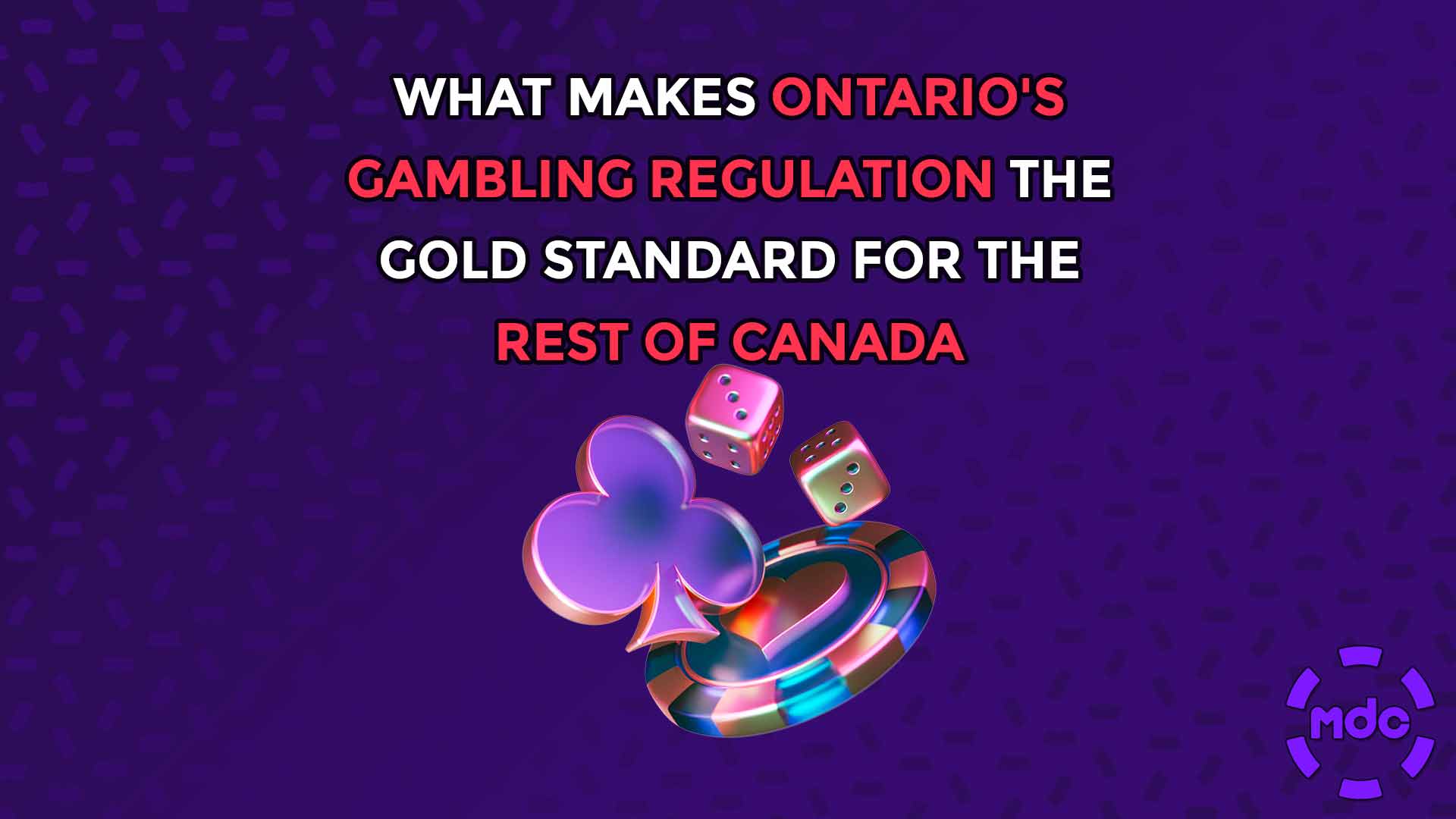What makes Ontario’s Gambling Regulation the gold standard for the rest of Canada
Online gambling has really taken off in Canada recently, and it doesn’t seem like it’s going to slow down anytime soon. More Canucks are playing slots and betting on sports from home, so provinces are rushing to update their rules for online casinos.
In April 2022, Ontario became the first province to fully regulate online gambling. This got attention worldwide because Ontario opened the market to private companies instead of just using a government-run system. The new setup focuses on keeping players safe while making sure companies compete fairly. This move also gave rise to a growing number of Ontario Casinos, offering players more choices than ever before.
Other provinces are still figuring things out. Alberta is just starting to look at new options, and Quebec mostly sticks with its government-run gambling site. Compared to Ontario, their systems feel a bit behind.
So, what makes Ontario’s way of doing things so good? Let’s look at the big changes Ontario made and what Alberta and Quebec could learn from them.
Ontario’s iGaming Model: Transparent, Competitive, and Open
Ontario has its own way of handling online gambling. The rules are set by iGaming Ontario (iGO), which is part of the Alcohol Gaming Commission Ontario (AGCO). Here’s how it works:
- AGCO makes the rules. Any company that wants to run an online casino in Ontario has to pass strict checks. That means they have to show they have a good track record, enough money to run their business, and systems that are safe and work properly.
- iGO steps in once a company gets approved. They make a deal with the operator that explains how things will work, like how money is shared and how the rules will be followed. iGO also keeps an eye on the operator to make sure they’re doing everything properly.
Since Ontario lets many different casinos operate, you get more choices, better competition, and improved services. Plus, more money goes back to public programs. Best of all, with everyone playing by the same clear rules, it makes for a safer experience for everyone.
And in June 2025, Ontario announced a full review of its iGaming model. Not because things aren’t working at Low Minimum Deposit Casinos Canada, but because they want to make sure it keeps getting better. That ongoing commitment showcases that Ontario is not just setting the bar. It’s raising it.
Alberta’s Limited Progress: Controlled but Restrictive
While Ontario has gone full steam with an open and competitive market, Alberta has taken a much more cautious approach. For a long time, Alberta’s gambling scene was essentially a government monopoly.
The only legal, regulated option for online casino games and sports betting was PlayAlberta. This platform is run by the Alberta Gaming, Liquor & Cannabis. But because there’s only one legal site, there’s not much competition.
This is why Alberta has been exploring the idea of opening up its market to private operators, much like Ontario. There’s been a lot of talk and some legislative movement, particularly with Bill 48, the iGaming Alberta Act. This bill paves the way for private operators to enter the market.
But progress has been slow. Even with new gambling laws moving forward, private companies probably won’t start competing in Alberta until early 2026. This means as of now, players don’t have many options, and the whole system isn’t as open or clear as Ontario’s.
Quebec’s Mounting Pressure for Reform
While some provinces are opening up or at least thinking about it, Quebec has mostly stuck with its current setup. It still relies on Loto-Québec as the only legal gambling option.
One reason for this is that many people in Quebec feel strongly about supporting government-run businesses. They see these businesses as important for keeping their identity and helping their local economy.
But things may be starting to change. In June 2025, more people began urging the Quebec government to think about following Ontario’s example. Groups like the Quebec Online Gaming Coalition, which includes operators like DraftKings, Flutter, and Betway, are actively pushing for these changes.
Currently, many players in Quebec turn to unregulated grey-market sites. These operators work without legal oversight, meaning there is little protection. This creates risks both for players and for the province’s ability to benefit from the growing iGaming market.
Quebec’s way of handling gambling shows what happens when a province doesn’t update its system. Besides losing money to illegal sites, players don’t get the same safety and protections that come with a well-regulated, competitive market.
But as of now the pressure is building, and the 2026 provincial election is being seen as a key opportunity to push for the much-needed reforms to bring Quebec’s iGaming market into the modern era.
Economic Impact: Ontario’s Revenue and Reinvestment Success
Ontario’s choice to open up its online gambling market has been a big win, not just for players and companies but also for the province’s finances. A well-regulated, competitive market clearly shows how it can bring in lots of money.
Let’s look at the numbers. Ontario’s online gambling market has grown a lot. From April 2024 to March 2025, it earned a total of $3.20 billion. That’s 32% more than it made the year before. People wagered $82.7 billion in total, with casino games making up the biggest part.
The Ontario Lottery and Gaming Corporation earned $630 million from online casino and sports betting in 2023-24, adding to the province’s general funds. The money earned goes back into public services, player safety programs, and improving rules.
By comparison, Alberta’s PlayAlberta made $235 million in net sales in 2023-24. While it’s growing, Alberta’s single-operator system limits how much it can expand compared to Ontario’s competitive market.
Quebec’s Loto-Québec earned nearly $3 billion in revenue for 2024-25, with a net income of $1.5 billion. But Quebec hasn’t changed its system to allow for more competition. This could stop it from growing much in the future.
Ontario’s experience proves that having a competitive gambling market can lead to big financial gains. Other provinces could really benefit by following Ontario’s lead.
Consumer Protection and Responsible Gambling Leadership
One of the best things about Ontario’s system is that it’s very serious about keeping players safe and promoting responsible gambling. This isn’t just a small add-on; it’s a core part of the rules and how the whole system is run.
All approved online casinos must give you tools to help you stay in control. This includes letting you set limits, taking breaks when you need to, and even options to ban yourself from playing. Ontario also runs public campaigns to teach people about safe gambling.
Besides offering these tools, Ontario casino sites have to follow rules to keep players safe and the market fair, such as:
- Anti-Money Laundering (AML): Casinos must have strong plans to prevent illegal money from being washed through their sites. This includes Know Your Customer checks and reporting anything unusual to the Financial Transactions and Reports Analysis Centre of Canada.
- Age Verification: Strict age verification processes are mandatory to prevent underage players from playing online. Casinos must use reliable methods to confirm a player’s age, typically 19 years or older in Ontario.
- Fairness and Game Integrity: All games offered by regulated casinos must be fair. This means they use Random Number Generators to make sure game outcomes are truly random. Independent companies also test their systems to confirm that everything is honest.
- Secure Data Handling: Casinos are required to maintain encrypted data storage and comply with all Canadian privacy regulations, protecting players’ personal and financial information.
In comparison, the government-run gambling systems in Alberta and Quebec don’t share as much about their processes. This makes it tougher to know how well those protections are actually working.
Basically, Ontario sets a much higher standard for player protection. This level of care isn’t just a nice-to-have; it’s absolutely necessary.
Why the Rest of Canada Should Follow Ontario’s Lead
Ontario’s online gambling system is different in a good way. It allows many online casinos Canada to operate, so people have more options. The rules are clear and strict, which helps keep things fair. This setup also makes a lot of money for the province, which goes toward public programs and player safety.
For provinces like Alberta and Quebec, there is a real chance to learn from Ontario’s success. By opening up their markets and adopting strong regulations, they can create a modern and responsible gambling system that works for everyone.
As gambling becomes a bigger part of Canadian entertainment, the provinces that focus on transparency, innovation, and player safety will lead the way. Their choices today will shape the future of gambling across the country.







